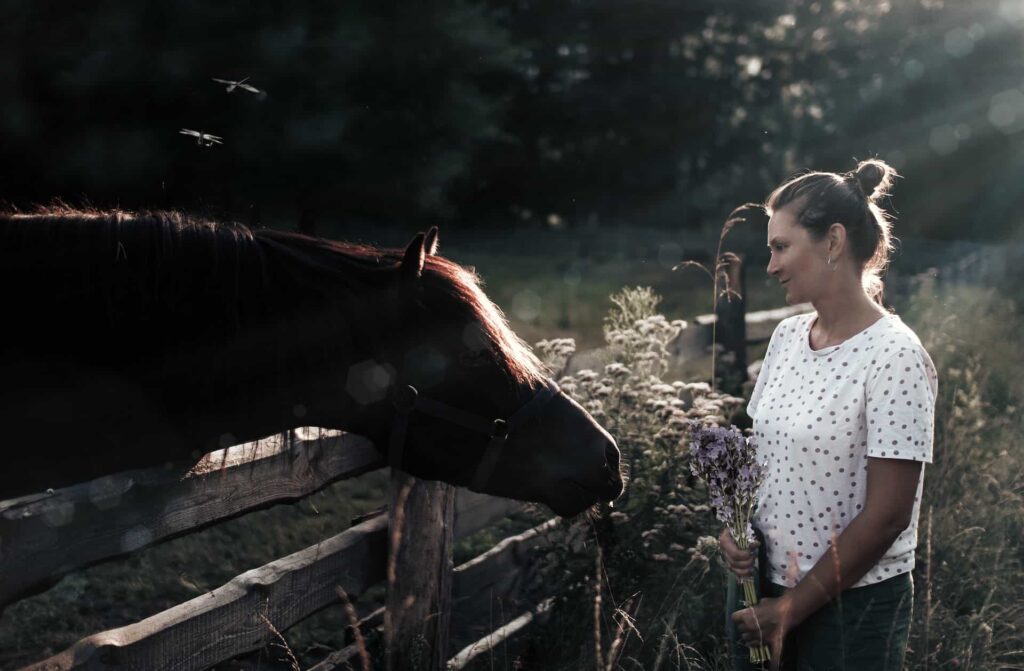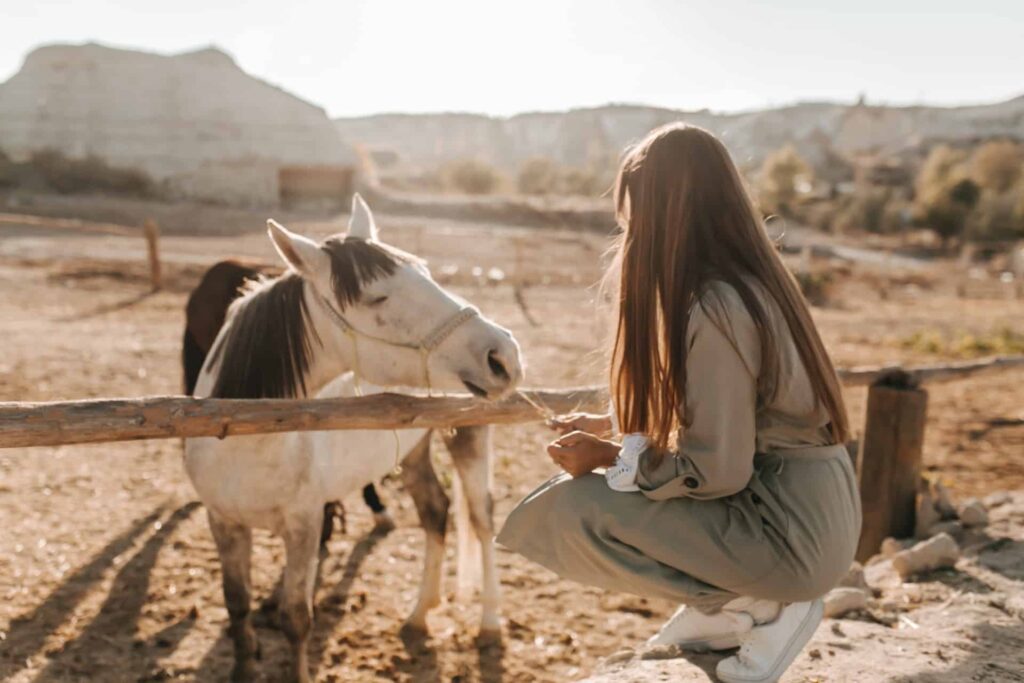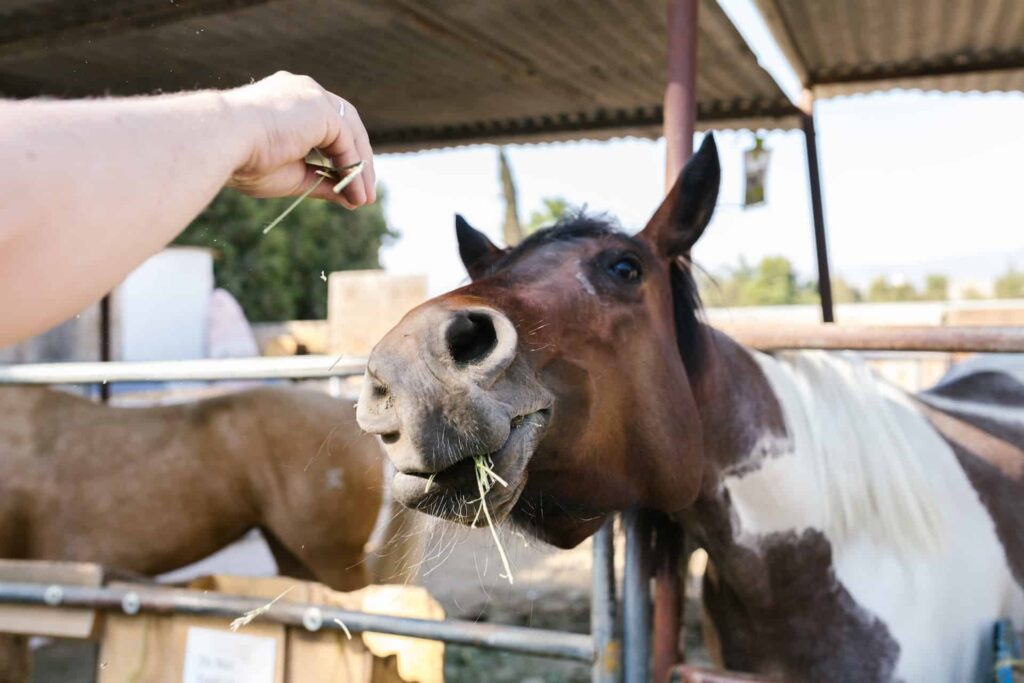As horses age, their nutritional needs and ability to maintain a healthy weight can change. Ensuring older horses maintain a proper weight is important for their overall health and well-being. One common challenge faced by owners of older horses is figuring out the right feeding routine to help these equines gain weight without causing health issues. This article aims to share valuable insights on what to feed older horses to gain weight.
Understanding the various factors that can affect an older horse’s weight, such as their overall health, dental condition, and metabolism, helps identify the appropriate feeding strategy. Furthermore, knowing the specific nutritional needs of older horses, as well as any potential digestive concerns, can help horse owners make informed decisions about the most effective feeding options for weight gain.
It’s also good to be aware of any diseases or health conditions that could cause weight loss in older horses, and the importance of regularly monitoring and adjusting their feeding routine as needed. This includes the possible use of supplements and other treatments, along with taking into consideration the potential challenges of feeding older horses in herd settings.
Key Takeaways
- Proper nutrition and feeding strategies are crucial for maintaining a healthy weight in older horses.
- Understanding age-related challenges, such as health conditions and dental issues, aids in successful weight management.
- Regular monitoring and adjustments to the feeding routine help ensure optimal weight gain and overall well-being for older horses.
Understanding Horse Weight and Aging
As horses age, their nutritional needs and ability to maintain an optimal body condition may change. Caring for an older horse requires a clear understanding of how weight and aging interact, in order to provide appropriate nutrition that supports overall health and well-being.
Weight management in older horses starts with evaluating their body condition score (BCS). BCS provides a standardized method to assess the horse’s body fat distribution, taking into consideration factors such as age, breed, and work. It uses a scale from 1 (very thin) to 9 (obese), where a score of 5 is considered ideal. Regularly monitoring your older horse’s BCS can identify weight changes and help inform necessary dietary adjustments.
Diseases and conditions are more prevalent in older horses, making weight management even more critical. Issues such as arthritis, dental problems, and hormonal imbalances like Pituitary Pars Intermedia Dysfunction (PPID) can impact an older horse’s ability to maintain a healthy weight. Similarly, metabolic conditions like Equine Metabolic Syndrome (EMS) can predispose senior horses to obesity and increased risk of laminitis.
When trying to achieve weight gain in thin older horses or maintain a healthy weight in those with existing dental or metabolic conditions, a well-balanced feeding plan is a perfect start. One approach is to provide a high-quality senior feed containing sufficient calories, protein, and fiber to sustain the horse’s energy needs and muscle mass. This method can be tailored to each horse’s specific needs and adjusted according to their BCS.
Supplementing the horse’s diet with additional nutrients may be necessary, depending on their individual needs. For instance, older horses prone to arthritis can benefit from joint supplements, while those with dental issues may require chopped forage or soaked hay cubes to ensure adequate fiber intake.
Promoting your geriatric horse’s overall health can support weight management and overall quality of life. Regular dental care, parasite control, an appropriate exercise program, and prompt veterinary attention, when needed, can help senior horses maintain optimal body weight and condition.
Adapting feeding strategies and management practices for older horses according to their age-related changes and health conditions is crucial for promoting weight gain and maintaining overall well-being. By staying proactive and attentive to your horse’s unique needs, you can support their health and longevity.
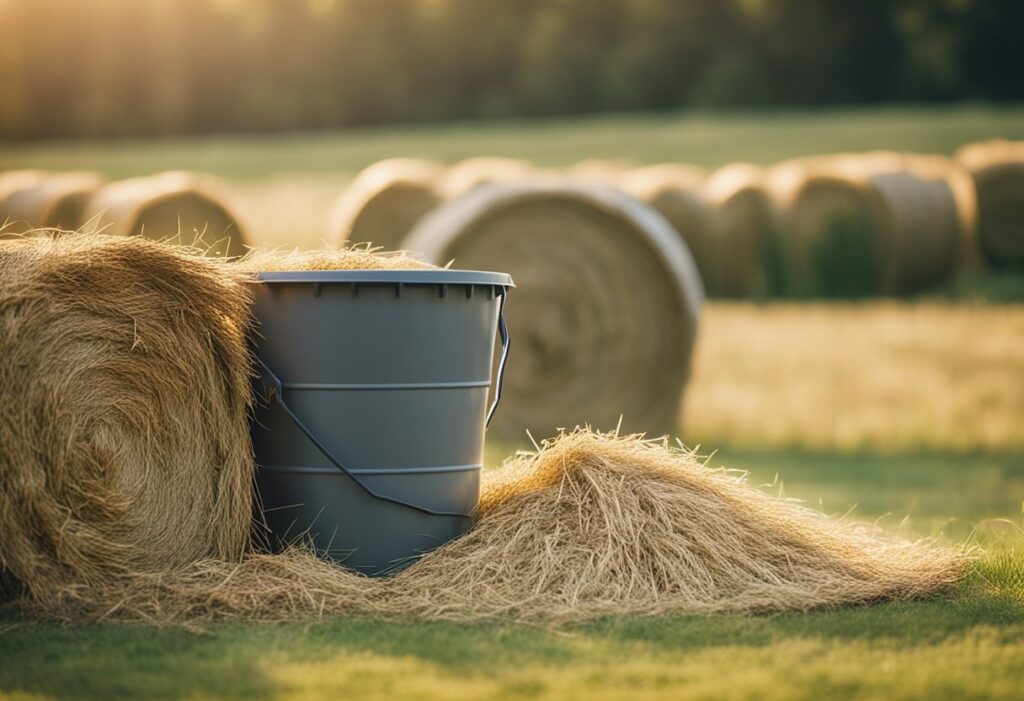
Nutritional Needs of Older Horses
Older horses often struggle with keeping on weight due to factors such as decreased nutrient absorption, dental issues, and reduced metabolic efficiency. To support their weight gain, it’s important to understand the nutritional needs of older horses and provide them with the right balance of forage, grain, water, and nutrients.
Forage should be the main component of an older horse’s diet, as it provides essential nutrients and promotes gut health. High-quality hay or pasture can fulfill the horse’s fiber requirements, while also providing energy, vitamins, and minerals. To accommodate horses that struggle with chewing and digesting long-stemmed forage, it may be necessary to offer chopped hay or soaked hay cubes.
Incorporating grain into their diet can further support older horses’ energy needs and promote weight gain. Opt for senior feeds that are specifically formulated for older horses, as they typically contain high-quality sources of protein and easily digestible fiber, helping maintain muscle mass and promote overall health. Nutrition considerations for the aged horse highlight the importance of adjusting their dietary requirements based on the level of physical activity and their tendency to gain weight.
Oil can be a beneficial addition to an older horse’s diet as a calorie-dense, low-starch energy source that can assist in weight gain without overloading the digestive system. Sources of oil include vegetable oil, rice bran oil, and flaxseed oil, all of which are high in omega fatty acids, promoting a healthy coat and immune system.
Adequate water intake is crucial for horses of any age, but older horses may be more prone to dehydration. Providing fresh water daily and monitoring their intake can help prevent the impact of colic and other health issues associated with dehydration.
When considering nutrients for older horses, pay special attention to their calcium, phosphorus, and magnesium levels, as these minerals play a vital role in skeletal maintenance. Moreover, additional vitamins, such as vitamin E and selenium, can be beneficial for the immune system. A well-rounded diet along with specific supplements tailored to the horse’s needs can help ensure they are receiving the essential nutrients for maintaining good health.
In conclusion, taking into account each horse’s unique needs and monitoring their diet closely ensures older horses receive the necessary nutrition to maintain or gain weight effectively.
Issues with Digestion and Absorption
Older horses often struggle with proper digestion and absorption of nutrients, which can make weight gain difficult. One common issue is dental problems, which can affect their ability to properly chew and break down feed. Chewing plays a vital role in the horse’s digestive process, as it increases the surface area of the feed particles and helps to mix it with saliva, facilitating the breakdown of starches in the mouth. Dental issues such as tooth wear, missing or loose teeth, and infections can hinder chewing efficiency and may lead to choke or colic in older horses.
Gastrointestinal ulcers are another concern for these animals, as they can interfere with nutrient digestion and absorption. Stress, illness, and certain medications can contribute to the development of ulcers in the horse’s stomach or intestines, particularly when the gut’s protective lining is compromised. Ulcers can cause pain, and reduced appetite, and contribute to weight loss in older horses. It’s necessary to address any underlying causes, such as parasites or bacterial infections, that might be contributing to gastrointestinal ulcers.
Efficient gut function also depends on maintaining healthy populations of beneficial microorganisms. These microbes help break down fibrous plant material and produce essential nutrients such as vitamins and fatty acids. As horses age, their gut microbiome can become imbalanced or disrupted, leading to reduced digestive capacity and the risk of colic. Regular deworming and maintaining a balanced diet can help support a healthy gut microbiome in older horses.
Optimizing equine nutrition aids in digestion and absorption in older horses. An equine nutritionist can advise on appropriate feed formulation and dietary adjustments to promote better use of nutrients and support the horse’s overall health. Highly digestible feeds with increased fiber content can help enhance gut function and provide energy for weight gain. Incorporating high-quality protein sources, vitamins, and minerals can ensure that older horses’ unique nutritional needs are met, assisting them in achieving a healthy body condition in their later years.
Feeding Options for Weight Gain
Feeding older horses to gain weight can be a challenge, especially when dealing with dental issues, metabolic disorders, or other health concerns. Below are some practical feeding options for weight gain that consider the specific needs of older horses.
Hay and Hay Alternatives
Good quality hay is great for weight gain, and horse owners should aim to provide a mix of grass hay and alfalfa hay. Grass hay provides necessary fiber, while alfalfa hay is higher in energy, protein, and calcium. Ensuring access to fresh, clean water at all times is also vital.
For horses with dental problems or difficulty chewing hay, hay cubes or hay pellets are viable alternatives. Hay cubes are made from compressed hay, whereas hay pellets have a finer consistency. Wetting the cubes or pellets with water transforms them into a softer mash that is easier for older horses to consume.
Complete Feeds and Low-Starch Options
A complete feed specially formulated for seniors is beneficial for older horses to gain weight. These feeds are designed to be a balanced diet that can be fed alone or in conjunction with hay. Look for feeds with higher levels of fat and protein and lower levels of starch to promote weight gain without risking issues such as laminitis.
Beet Pulp and Vegetable Oil
Adding beet pulp to the horse’s diet can be another effective method for weight gain. Beet pulp is high in fiber and calories, yet low in starch, making it an ideal supplement for older horses. Soak the beet pulp before feeding to create a mash consistency.
Including vegetable oil in a horse’s diet is an excellent way to add concentrated calories without excess volume. Begin with a small amount (1/4 cup) and gradually increase to avoid digestive upset. Vegetable oil can be mixed into the horse’s regular feed or mash.
By incorporating a combination of these feeding options, horse owners can better meet the nutritional needs and weight gain goals of their older horses while minimizing the risk of health complications.
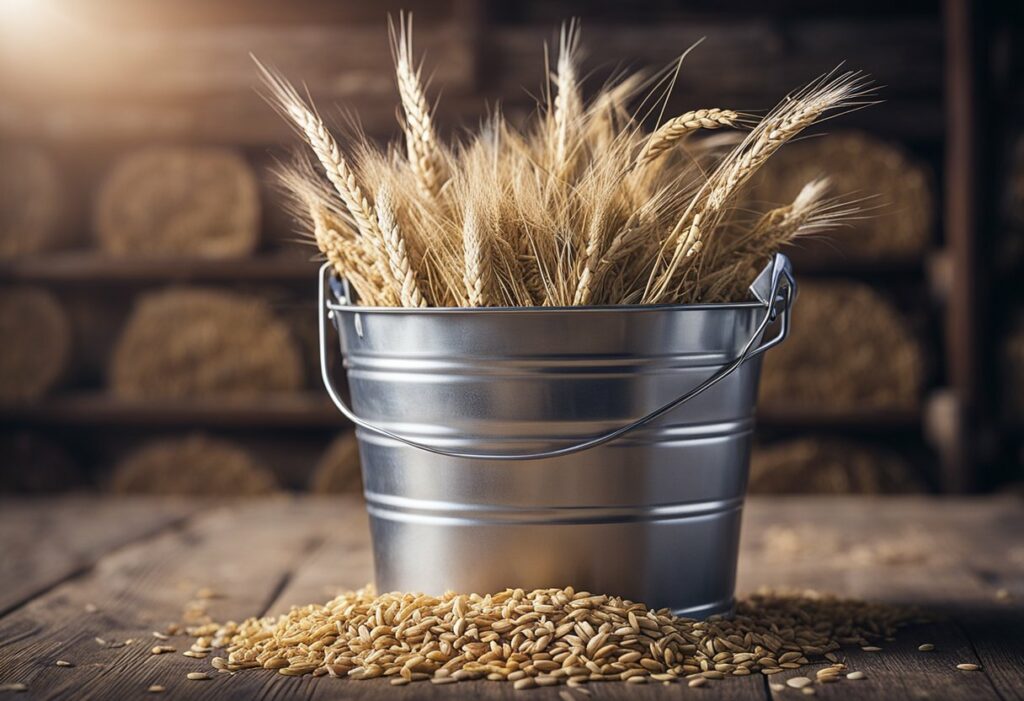
Common Diseases Associated with Weight Loss
Weight loss in older horses can be attributed to various health issues. Addressing these underlying problems may help horses gain or maintain a healthy weight.
One common ailment that can cause weight loss in horses is equine metabolic syndrome (EMS). This condition affects the horse’s ability to metabolize carbohydrates and can lead to insulin resistance, obesity, and laminitis. In severe cases, laminitis can cause chronic pain, resulting in weight loss due to the horse’s inability to graze comfortably.
Another prevalent issue in older horses is gastric ulcers. These painful sores in the horse’s stomach lining can lead to a decrease in appetite, ultimately causing weight loss. Gastric ulcers may result from stress, inadequate fiber in the diet, or frequent use of certain medications such as nonsteroidal anti-inflammatory drugs (NSAIDs).
PPID (Pituitary Pars Intermedia Dysfunction), also known as Cushing’s disease, is a hormonal disorder that can affect older horses. This condition can cause a variety of symptoms, including muscle wasting, a potbellied appearance, and weight loss. Horses with PPID may require a special diet and medical management to address these symptoms.
Arthritis is another common issue in aging horses, causing pain and inflammation in the joints. As with laminitis, arthritis can lead to chronic pain and result in weight loss as the horse’s ability to graze and move freely is diminished. Ensuring proper pain management and supportive care can help alleviate these symptoms and maintain a healthy weight.
In conclusion, various health issues can contribute to weight loss in older horses. Addressing the underlying causes, such as EMS, gastric ulcers, PPID, and arthritis, can help support proper weight gain and overall health. It is crucial to work with a veterinarian to develop a comprehensive care plan tailored to the individual horse’s needs.
Monitoring and Maintenance of Weight Gain
Putting weight on older horses requires a well-rounded approach, considering factors such as diet, dental care, and healthcare management. Horse owners should closely monitor their horse’s progress and consult their veterinarian for guidance to ensure healthy weight gain.
One of the first steps in developing a feeding program is to evaluate the horse’s current body condition. Owners can use a weight tape to measure the circumference of the horse’s chest and estimate its weight. Regular monitoring of the horse’s weight is crucial to track progress and adjust the feeding program as necessary.
Dental care plays a crucial role in a horse’s ability to gain weight. Older horses may suffer from dental problems such as wave mouth or tooth loss, which can impair feed intake and contribute to weight loss. Regular dental checkups by a veterinarian and prompt treatment of any issues will help ensure your horse can effectively chew and digest its food.
A comprehensive feeding program will take into account the horse’s nutritional needs and any medical or social factors that may be contributing to weight loss. For example, older horses may require commercial feeds designed to prevent weight loss and support weight gain. In addition to adjusting their diet, owners should maintain routine vaccinations and deworming schedules to promote overall health and prevent parasites from impacting weight gain.
Owners need to work closely with their veterinarian to address the root cause of weight loss in older horses. This may involve blood work, fecal analysis, or other diagnostic tests to identify underlying health issues that need to be managed to support healthy weight gain.
By staying attentive to their horse’s needs, maintaining good dental and health care routines, and working closely with their veterinarian, horse owners can help support healthy weight gain in their older horses and ensure they maintain optimal body condition.
Additional Supplements and Treatments
When it comes to feeding older horses for weight gain, making some adjustments to their diet and incorporating various supplements and treatments can be important. One of the key elements in older horses’ nutrition is adjusting their caloric needs according to their activity level and body condition.
A good starting point when feeding older horses to gain weight is providing them with senior feeds or complete feeds. These types of feed are specially formulated for older horses and typically contain higher levels of digestible fiber and essential nutrients, ensuring that the horse’s dietary needs are met. Equine Senior® horse feed is an example of such a feed that is specifically designed for the unique nutritional needs of aging horses.
For hard-keeper horses that struggle to maintain their weight, it can be helpful to include a ration balancer in their diet. Ration balancers are concentrated feed supplements that provide the required protein, vitamins, and minerals without adding excess calories. They help balance the nutrient intake, making it easier for the horse to gain weight.
Joint supplements, like glucosamine, can be beneficial in older horses to support joint health and mobility. As horses age, their joints may become stiff or less flexible due to wear and tear. Glucosamine is a natural compound that may help to reduce these symptoms and improve the horse’s overall mobility.
Probiotics are another useful addition to an older horse’s diet. These live microorganisms can help improve digestion and nutrient absorption by promoting a healthy balance of gut bacteria. Introducing a probiotic supplement can potentially enhance the horse’s overall health and improve their ability to gain weight.
Providing fresh water is always necessary for horses, regardless of age. However, older horses may need additional encouragement to drink. Ensuring clean, fresh water is always available will help the horse stay hydrated and support their overall health.
Fiber is a crucial component of a horse’s diet, especially for older horses. As they age, their ability to digest fiber may decrease, making it even more important to provide them with high-quality fiber sources. Hay or other forage should be offered in plentiful amounts, ensuring that the horse receives the necessary amount of roughage to maintain proper gut function.
Feeding an older horse for weight gain involves a combination of adjustments to their diet and the incorporation of specific supplements and treatments. Proper knowledge about horse nutrition, tailored feeds, and suitable supplements can help aging horses thrive and maintain a healthy weight.
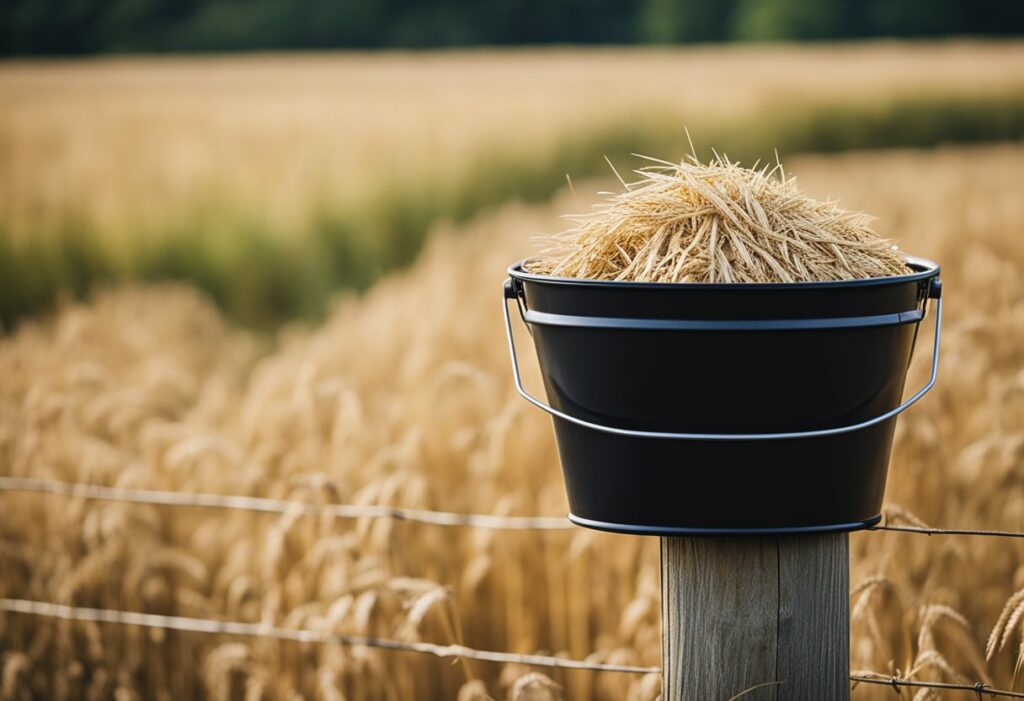
Feeding Strategies in a Herd Setting
Feeding older horses in a herd setting can be challenging, especially when the goal is to help them gain weight. As they age, horses can become less efficient at extracting nutrients from their food, which can lead to weight loss. Proper management of their diet helps maintain good health and promote weight gain.
It is vital to monitor the condition of older horses regularly, as weight loss or gain might not be visible under their coat. Feeling for their ribs can help assess their body condition. Providing them with the necessary nutrients and balancing their diet, both in quality and quantity is a key part of the feeding strategy.
One good source of nourishment for horses is pasture. Good quality pasture plays a crucial role in providing the necessary nutrients for older horses, while also giving them the opportunity to graze and exercise naturally. In a herd setting, ensure that older horses have easy access to sufficient pasture and are not being outcompeted by younger and stronger members of the herd for forage. If necessary, separate them during feeding time to provide adequate grazing space.
When designing feeding strategies for older horses, consider giving them more palatable and nutrient-dense feed options. This may include offering hay that is soft and easy to chew, processed feeds, or adding supplements to their diet. Always monitor their overall intake and adjust it depending on their age, weight, and energy requirements. Avoid overfeeding them and causing unnecessary strain on their digestive system.
Lastly, consider providing older horses with specialized feeding spots within the herd setting. This ensures that they receive the necessary nutrients without competition from younger and more aggressive horses. Be sure to observe their individual personalities and feeding habits to help create a comfortable environment for them to eat and maintain their weight.
By implementing these feeding strategies for older horses within a herd setting, it is possible to support their nutritional needs and promote healthy weight gain in a natural and confident manner.
Related: Horse Nutrition
Frequently Asked Questions
What are the ideal supplements to help an elderly horse gain weight?
Elderly horses can benefit from high-quality, easily digestible protein and calorie-dense supplements to help them gain weight. This might include rice bran, which is high in fat content and can provide additional calories without excess carbohydrates. Other potential supplements include flaxseed or stabilized ground flax, which are sources of omega-3 fatty acids that can help with inflammatory issues common in older horses.
How can beet pulp benefit older horses in maintaining weight?
Beet pulp is a popular feed ingredient for older horses because it is high in digestible fibers and relatively low in starch and sugar. This can help maintain a healthy weight by providing slow-release energy without causing unhealthy spikes in blood sugar levels. The soft and bulky nature of beet pulp also helps maintain proper gut function, which can be beneficial to older horses with impaired digestion or dental issues.
Which oil is most effective in promoting weight gain in senior horses?
Feeding oil to senior horses can promote weight gain since it provides a concentrated source of calories. Vegetable oils, such as corn, soybean, or flaxseed oil, are common options for this purpose. However, it is important to choose an oil that is high in omega-3 fatty acids, as these can help balance inflammation associated with aging. Flaxseed oil is particularly rich in omega-3 fatty acids and may be the most effective for promoting weight gain in senior horses.
What role does alfalfa play in helping old horses gain weight?
Alfalfa is a high-quality forage with elevated protein content and is a valuable addition to the diet of older horses needing to gain weight. Its high digestibility and nutrient-rich profile make it an excellent source of energy and amino acids, which promote muscle development and overall health. Including a portion of alfalfa hay or alfalfa pellets in the diet can contribute to weight gain in older horses.
How does a focused muscle-gaining diet work for elderly horses?
A muscle-gaining diet for elderly horses typically includes high-quality protein and well-balanced nutrients. This approach helps build muscle mass and support weight gain without overloading the horse with unnecessary carbohydrates or fats. Amino acids, such as lysine, methionine, and threonine, should be prioritized in the diet, as they are critical for muscle development. Additionally, maintaining a balance between forage, grain, and supplements helps ensure the diet meets the horse’s varied needs, promoting overall health and weight gain.
What feed adjustments can be made for quick weight gain in older horses?
Quick weight gain in older horses can be achieved through a combination of increasing caloric intake, adjusting the balance of nutrients, and addressing any underlying health issues that may be hindering weight gain. This may include providing smaller, more frequent meals to maximize nutrient absorption, switching to higher-quality hay, or incorporating calorie-dense feeds and supplements. Always consult with a veterinarian before making significant changes to an older horse’s diet to ensure that any underlying health issues are addressed and the horse’s individual nutritional needs are met.
Last Updated on October 10, 2023 by Nate Dewsbury
